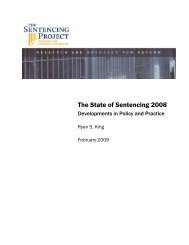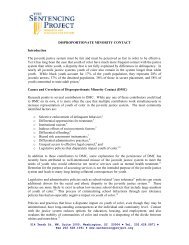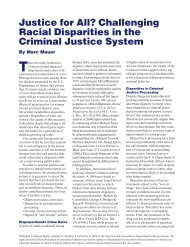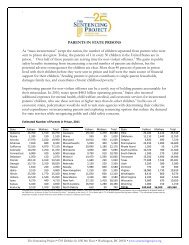VIEW PDF - The Sentencing Project
VIEW PDF - The Sentencing Project
VIEW PDF - The Sentencing Project
You also want an ePaper? Increase the reach of your titles
YUMPU automatically turns print PDFs into web optimized ePapers that Google loves.
Ensure Program Policies and Practices Involve Families<br />
Consistent with the guiding principle to “empower communities and engage youth<br />
and families” because “their strengths, experiences, and aspirations provide an<br />
important perspective in developing solutions” in the 2011 Program Plan, OJJDP<br />
should have an intentional focus on increasing family and youth involvement in all<br />
program planning and grant making activities. At a minimum, OJJDP should conduct<br />
focus groups to hear the concerns of families, provide online resources for families<br />
to better understand and navigate the justice system, and fund parent resource,<br />
support, and training centers to provide direct services to families of youth involved<br />
in the justice system.<br />
Improve Data Collection<br />
Race, Ethnicity and Gender<br />
We applaud OJJDP for recognizing the importance of research, evaluation, and data<br />
collection in the 2011 Program Plan. However, more improvements for data<br />
collection at the State and local level are still needed. First, few States and localities<br />
are able to achieve meaningful changes in their juvenile justice systems without<br />
adequate data, particularly data disaggregated by race, ethnicity, and gender so<br />
communities are able to develop culturally and linguistically appropriate services<br />
for youth and their families. OJJDP should prioritize this level of data collection<br />
through policy guidance, resource allocation, and training.<br />
Transfer to the Adult System<br />
Even the most cursory data on youth prosecuted in the adult criminal justice<br />
system via judicial, statutory, or prosecutorial waiver mechanisms and age of<br />
jurisdiction laws are not currently collected or reported, despite the widespread<br />
use of transfer to the adult system. <strong>The</strong> Administration has made progress on<br />
collecting this information at the federal level by recently funding the Survey of<br />
Juveniles Charged in Criminal Courts through the Bureau of Justice Statistics. <strong>The</strong><br />
Administration should require states to track the frequency with which juveniles<br />
are transferred to the adult system and evaluate the impact of prosecuting youth as<br />
adults. In addition, the 2011 OJJDP Program Plan should be modified to ensure that<br />
youth processed in the adult system are included in the scope of funded research.<br />
School Discipline<br />
<strong>The</strong>re must be better data collection on the consequences of school discipline (i.e.,<br />
suspensions, expulsions, corporal punishment, referrals to disciplinary alternative<br />
schools and court referrals). <strong>The</strong> Administration should require that measures of<br />
school discipline be used in assessments of school success as part of the Elementary<br />
and Secondary Education Act. Signs of poor school climate, high disciplinary rates<br />
3















